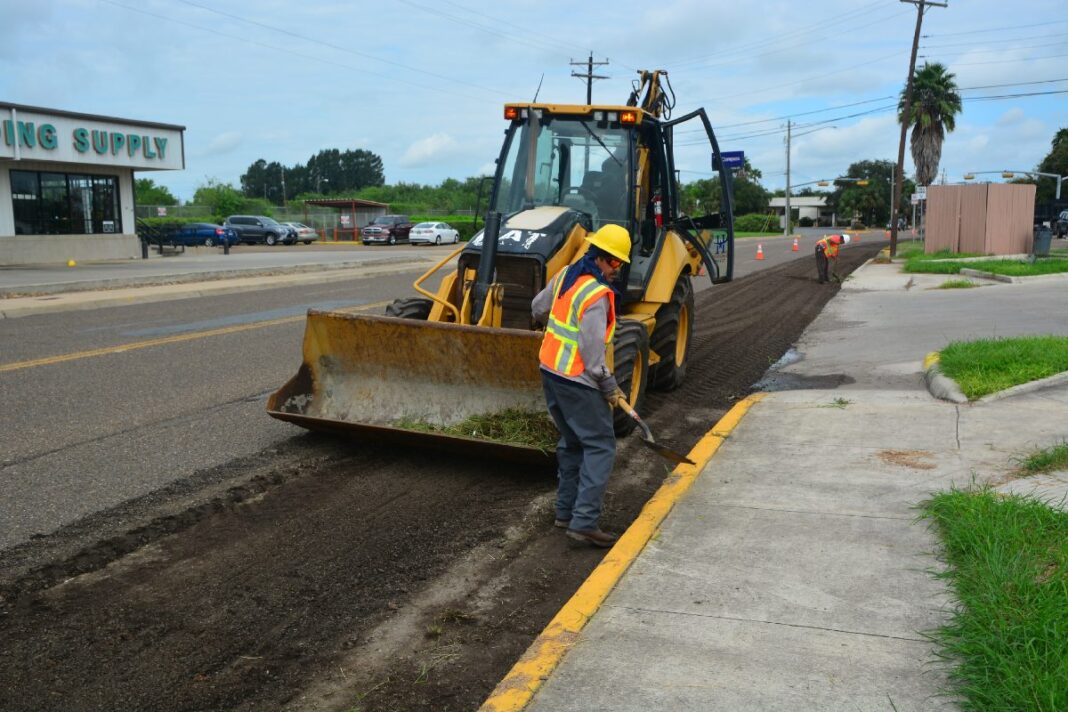HARLINGEN — The city’s $22 million federal stimulus check is going to help fund water, sewer and drainage projects while expanding broadband coverage.
At City Hall, City Manager Dan Serna is also giving every city employee a $1,000 bonus for working during the coronavirus pandemic.
Across the country, the $1.9 trillion American Rescue Plan Act aims to help local governments recover from the economic slowdown stemming from the pandemic.
Earlier this week, city commissioners reviewed a list of projects the city plans to fund with its $22.1 million stimulus package whose first $11 million payment is expected to come in next week.
During a meeting, officials presented plans to fund $10.3 million in WaterWorks projects, $4 million worth of drainage projects and a $4 million project aimed at expanding broadband coverage across the city.
Meanwhile, they are setting aside $2.1 million to help the city offset revenue losses.
$10.3 million WaterWorks projects
Across the WaterWorks System, General Manager Tim Skoglund plans to use $10.3 million in federal aid to cut the costs of $33.8 million worth of water and sewer projects tied to his $150 million 20-year master plan.
At the city’s sewer plant built in 2016, Skoglund plans a $12 million “highest-priority” project aimed at expanding the plant’s treatment capacity.
The plant upgraded in 2017 to treat 10 million gallons of wastewater a day is designed to boost capacity to 30 million during two-hour periods.
But while the city generates about five million gallons a day, peak flows are reaching 25 million gallons a day, Skoglund told commissioners during Wednesday’s meeting.
Now, he’s planning a $12 million project to expand the plant’s capacity.
“There’s nothing about the plan upgrade done in 2017 that’s at fault,” he said. “I wouldn’t change that design.”
At the sewer plant, Skoglund also plans a $5.3 million project aimed at removing 10 years of accumulated sludge while upgrading the plant’s sludge processing and dewatering system, redesigning its lagoon and disposing the waste at the landfill.
Along the First Street area, Skoglund plans a $6.3 million project to replace asbestos-cement pipe.
Meanwhile, he also plans a $4.1 million project to expand water lines into town lake and a $6.1 million project to replace 16,000 feet of clay pipelines and 66 manholes at 16 sites.
$4 million drainage project
As part of the federal aid package, officials are setting aside $4 million to fund drainage upgrades.
During a presentation, Assistant City Manager Carlos Sanchez said the money will fund storm sewer projects along the Jefferson Street area and along the Business 77 and 13th Street areas.
Meanwhile, city crews plan upgrades to a Lozano Street detention pond and a Commerce Street area storm sewer system.
$4 million broadband project
The stimulus package will also fund a $4 million program to expand the city’s broadband coverage.
Across town, 5,415 of the city’s 21,451 homes lack internet service, Sergio Mujica, the city’s technical director, said, pointing to 2019 Census figures.
“The goal is to provide Wi-Fi connectivity throughout the city in order to supply access to students, residents and workforce to help bridge the digital divide, close the homework gap, allow for home-based schooling and work-from-home,” Mujica said during a PowerPoint presentation.
Project costs include hiring a consultant to help the city expand its coverage.
A s part of the project, officials plan to expand coverage using sites including Baxter Lofts, the police department’s communications tower, the Stuart Place water tower, 1,500 utility poles, city parks and five school district locations.
“My main concern … is costs later down the road,” Commissioner Victor Leal said. “Today, we’re replacing Wi-Fi systems that are probably five or six years old. I just want to know how we’re going to pay for it into the future.”
To help fund annual $132,000 maintenance costs, officials might charge a small fee, Mayor Chris Boswell said.
“As a city, we need to begin the process of investing in this type of infrastructure,” Boswell said.
“It’s as important as electricity and water in the current environment that we’re in and the sooner we start making those investments the better off, I think, our city will be in the future and the idea of trying to also incorporate an expanded fiber optics system will be good for business,” he said. “It will attract business that, you know, might not otherwise come to our community because they can’t tap into fiber optics.”
City to offset $2.1 million in revenue losses
As part of the stimulus package, officials plan to use $2.1 million to offset revenue lost as a result of the pandemic.
During the fiscal 2019-2020, the pandemic helped cost the city’s general fund $1 million while the city lost $204,000 in hotel occupancy revenue, its sanitation fund lost $205,863, the Harlingen Municipal Auditorium lost $191,063, the Tony Butler Golf Course lost $124,277 and the Free Trade Bridge lost $195,513, Robert Rodriguez, the city’s finance director, said.




